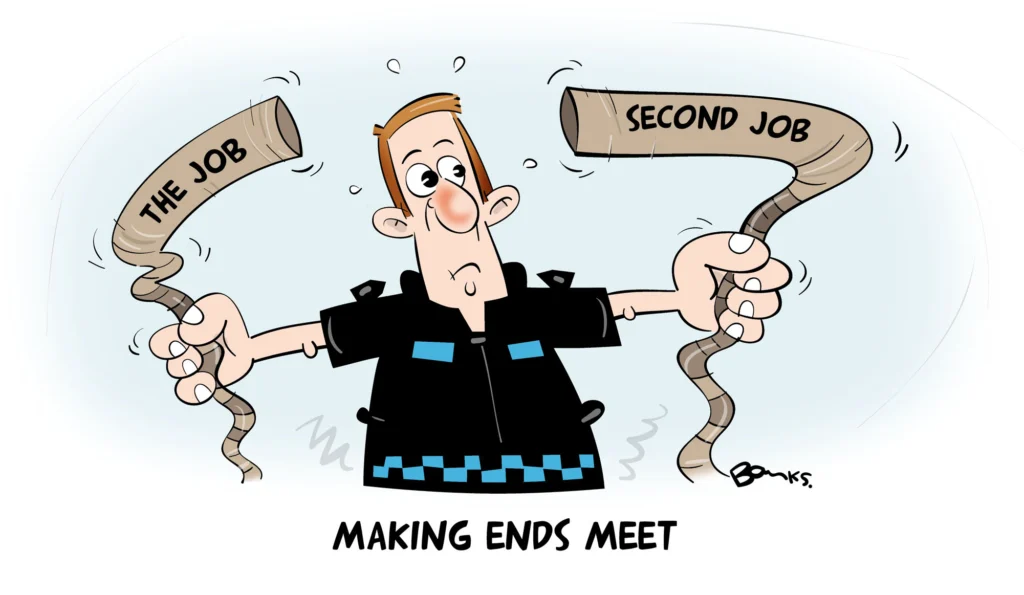Analysis
Viewpoint: No, don’t stop the Carnival, but should we?

Chris Hobbs attended the Notting Hill Carnival for Police Oracle as an observer and says the danger of crushing remains the main threat to public safety
It was a shocking video that has sent shockwaves through the police community and caused considerable consternation. So too did the fatal stabbing of a Bristol rapper, other stabbings and attacks on police, all of which marred the end of carnival.
But the incident I am referring to had the potential to end in disaster and highlights the strong arguments for making alternative arrangements for Europe’s biggest street carnival.
The footage, shot from a first- floor window, although brief, showed a street crammed with a swaying, moving, densely packed crowd. To even the most inexperienced observer it looked potentially catastrophic and trapped within it were a serial of police officers who were helpless as they were swept along. Such was the horror of the event, that, through the police grapevine, it transpires that officers in that group thought they were going to die.
As I viewed the video, the one word that reverberated around my mind was Hillsborough. It was only later that I recalled the tragedy at the Hajj in 2015, when 2,000 Muslim pilgrims perished due to over-crowding and crushing.
Subsequently, another officer stated that he and colleagues were involved in a separate but similar incident of potentially life-threatening crushing. I, personally, became concerned as I walked up Portobello Road and found myself under the Westway. Whilst there was no swaying or pushing, the density of the crowd made me feel unsafe and I turned back.

Dramas on Carnival Sunday.
Yet the Carnival weekend had begun well with Children’s Day. Whilst I was conserving my energy for an appearance on Monday, tens of thousands took to the streets and the media had a field day and rightly so with the enthusiasm of the children and an abundance of spectacular costumes.
The day however saw sadness when it was reported that police horse, Sandown had collapsed in the street whilst preforming duty at the Carnival; a devastating experience for his rider and Mounted Branch colleagues.
An incident that did grab media attention was the collapse of a TFL bus shelter which succumbed to the dancing feet of those that had climbed on top of it. Footage showing the collapse of the shelter and the near magical disappearance of those dancing on its roof did generate interest on both MSM and SM. Met officers attended and there were reportedly just several minor injuries.
A third dramatic episode, which could and should have reflected well on the Met involved a pregnant female who went into labour on the streets of carnival. Two Territorial Support Group medics delivered the baby while a third ‘level 3’ female PC took on the role of an ‘encouraging partner’ and, like the medics, apparently did a superb job. The remaining serial of officers formed a protective privacy cordon around Mum and her carers.
This story, which could have been expected to attract media attention without the background of Carnival, in fact gained little traction despite numerous media outlets being informed. My London gave it a brief mention referring to Met officers ‘assisting as did the Metro. The full role of Met officers sadly, never saw the light of day.
Thus, Sunday was eventful and hundreds of thousands, including myself, descended upon Carnival on the Monday. Knife arches were present on the Carnival borders but there was no compulsion in terms of people being directed to go through them. Watchful eyes supervised young, somewhat youthful looking officers but the few who were ‘stop and searched,’ took the intrusion in good part.
Carnival Monday; Good relations; Good vibes.
The atmosphere, that I personally witnessed, within the designated area of Carnival was good natured and exuberant. Everyone seemed determined to enjoy themselves with drink in abundance. Carnival floats, all exuding Caribbean music of one genre or another, were each followed by hundreds if not thousands. Food stalls served a variety of dishes with jerk chicken a clear favourite. Alcohol sales were plentiful and varied with the best bargain seemingly bottles of beer at £2 each.
Speaking as an ageing male, I was treated with courtesy and respect, but of particular interest was the relationship between Carnival revellers and the police officers on duty. It is no secret that the Met have been through a difficult time with activists, the media, London’s Mayor and former Met senior officers, accusing the force and its officers, amongst other transgressions, of racism. Given the constant stream of allegation and denigration with the implication that there was a virtual state of war between the Met and London’s black community, a visitor with only Guardian articles for reference would be astonished at the cordial relationship which existed between police and revellers across the streets that I walked.
I confess that I was concerned that officers would face the same level of abuse as I witnessed on anti-lockdown/anti vaxx protests. In fact, throughout most of the Carnival footprint, relations between revellers and police were not simply cordial but positively friendly. Those lost in the disorientating maelstrom of crowds and music asked and received help. Amicable, respectful conversations took place while those who had too much alcohol or became ill or suffered injury were helped by concerned, sympathetic officers. I did not witness one incident of any sort of insult or abuse towards any officer.
At about 8.15pm I decided I’d seen enough, and after wondering around Powis Square, which seemed a hub for tempting food stalls and, after viewing a superintendent out and about with his officers, I headed for Paddington Station and home.
Dusk falls and trouble begins.
After dumping my faithful rucksack, I headed to the local pub in order to ‘rehydrate.’ As I entered, friends asked me how Carnival had been and I waxed lyrical painting a picture of hundreds of thousands having a great time, facilitated by police. I even expressed the view that, based on what I’d seen, this could perhaps be some sort of ‘watershed moment’ in terms of relationships between police and the black community thus undermining the constant negative mantra of activists.
Gradually, though, news began to filter through of trouble at Carnival, seemingly around the Ladbroke Grove area where I knew I hadn’t been. Those reports included a serious stabbing incident and attacks on officers with numerous activations of emergency buttons on the radios of those officers.
As the dust settled the next day, it became clear the serious stabbing was in fact a fatal one. Graphic video emerged of a chaotic, bloody scene in which officers could be seen desperately trying to save the life of the victim, subsequently named as Takayo Nembhard. It later became known that he was a drill music rapper who performed under the moniker of TKorStretch.
As well as treating Takayo, officers also had to remove him through a hostile crowd in order that he could be transported by ambulance to hospital. The next challenge for police was, amidst that chaos, to preserve a crime scene. It would seem that there were also around seven other stabbings and perhaps it was fortunate that there were not further fatalities.
The final total given by the Met at the end of what turned out to be torrid evening for many officers showed that 74 of those officers were injured, primarily as a result of attacks while two female officers were the victims of sexual assault.
Carnival reflections
It has been pointed out that the 200 plus arrests were fewer than in previous years but those who know public order are only too well aware that the number of arrests does not reflect the level of disorder which occurs during police public order operations; indeed, the fewer the arrests, the more violent that event frequently is. It remains to be seen that whether the Met allocate additional resources to identify those involved in the violence. This would be in addition to those who will be investigating the Takayo’s murder and the sexual assault of a female officer. An arrest has been made in respect of the other female officer/victim.
Predictably there have been calls for the Carnival to be discontinued or moved to a more open venue such as Hyde Park. The response to criticism and concerns is that the incidents which occurred, including murder, don’t justify ending a ‘street party’ attended by hundreds of thousands.
However, whilst criticisms and suggestions are valid points of view, it seems unfortunate that the post Carnival debate has involved allegations of racism. The bottom line is that violence, whilst hugely significant, is not the primary factor here. As those supportive of retaining Carnival as a street festival have pointed out, there was serious violence at both the Leeds and Reading festivals with a death resulting, it would appear, from drugs. It should be noted, however, that these are ’private’ events and, as such, unlike Carnival, security isn’t the direct responsibility of police.
One less than palatable factor in the ongoing, post-Carnival debate is an apparent acceptance by some that attacks on police, albeit by a relatively small percentage of those attending, is acceptable collateral damage.
Is a major disaster inevitable?
The key issue here surely revolves around the possibility of a Hillsborough/ Hajj type catastrophe where, as a result of crushing or stampede, we could see multiple deaths and life changing injuries on streets jammed tight with revellers. Anyone who feels that this is an exaggeration should look at the ‘crushing’ Tik Tok video which shows the helpless police serial and the fact that officers not only felt they were about to die, but, again according to the above-mentioned police grapevine, were pressing their radio emergency buttons and informing horrified colleagues working in GT (the control room) of that fact. There were also reports of dangerous overcrowding and congestion at Oxford Circus as persons boarded trains heading west to Carnival.
Perhaps, in future discussions with Carnival organisers senior Met officers should play recordings of these radio transmissions in order to focus minds.
Of course, if any future Carnival results in a major disaster, the news of which reverberates around the world, the Met will inevitably be blamed.
Chris Hobbs is a former Met officer who worked in Special Branch
Category: Ops
Tags: Faith and Community TensionFree ArticlesKnife CrimeLondonMetropolitan Police ServiceOfficer SafetyPublic Order
Advertisement
Job of the week
Police staff investigator (PIP 2)

- Devon & Cornwall Police
- PPU, Ashburton; PPU, Torquay; PPU Bodmin CID Torquay; CID Exeter, CID Barnstaple, CID Liskeard, CID Bodmin, CID Newquay, CID Falmouth, CID Cambourne, CID Penzance, CID Charles Cross
- Grade 7 - Starts at £36,630 rising by yearly increments to a maximum of £40,893 per annum
We are proud to be expanding our team and strengthening our investigative capacity across Devon and Cornwall by recruiting up to 35 experienced Police Staff Investigators (PIP 2) to help us deliver the highest level of service to our communities. Vacancies are within our Criminal Investigation Department and Public Protection Units.
Read more


